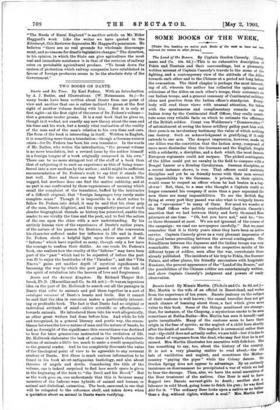TWO BOOKS ON DANTE.
Dante and his Time. By Karl Federn. With an Introduction by A. J. Butler, and Illustrations. (W. Heinemann. 6s.)—So many books have been written about Dante from one point of view and another that one is rather inclined to groan at the first sight of another volume dealing with him. But it is only at first sight—at the first sight of the cover of Dr. Federn's volume— that a genuine reader groans. It is a real book that he gives us, though in it we find, not exactly any new theory about the man and his time and his work, but a keenly vital realisation of the reality of the man and of the man's relation to his own time and ours. The form of the book is interesting in itself. Written in English, it is something more than a translation—though a German version exists—for Dr. Federn has been his own translator. In the words of Mr. Butler, who writes the introduction, "the present volume is no mere translation, but a revised issue by the author himself in a foreign tongue of a work originally composed in his own." There can be no more stringent test of the stuff of a hook than that of subjecting it to such an experience as this of being trans- ferred into a new medium by the author ; and it might be sufficient recommendation of Dr. Federn's work to say that it stands the test well. Here and there one may feel the manner a little rugged, but nowhere does one find the matter rubbishy, and at no part is one confronted by those vaguenesses of meaning which recall the complaint of the translator, baffled by the intricacies of a difficult original, that "foreign languages very rarely make complete sense." Though it is impossible in a short notice to follow Dr. Federn into detail, it may be said that his close grip of the man, Dante Alighieri, and his sympathetic pursuit of such slender biographical threads as history has preserved, enable the reader to see vividly the time and the poet, and to feel the action of the one upon the other with a new understanding. By his entirely human view of the experiences of Dante's earlier years, of the nature of his passion for Beatrice, and of the conversion his character suffered under her influence in life and in death, Dr. Federn sheds a helpful light upon those aspects of the "Inferno" which have repelled so many, though only a few have the courage to confess their dislike. As one reads Dr. Federn's book, one realises how the cruelty of the "Inferno" may have been part of the " past " which had to be repented of before the poet was fit to enjoy the beatitudes of the Paradiso "; and the "Vita Nueva" gains yet another depth of mystical significance in becoming the way by which the poet passed out of the hell of the spirit of retaliation into the heaven of love and forgiveness.










































 Previous page
Previous page